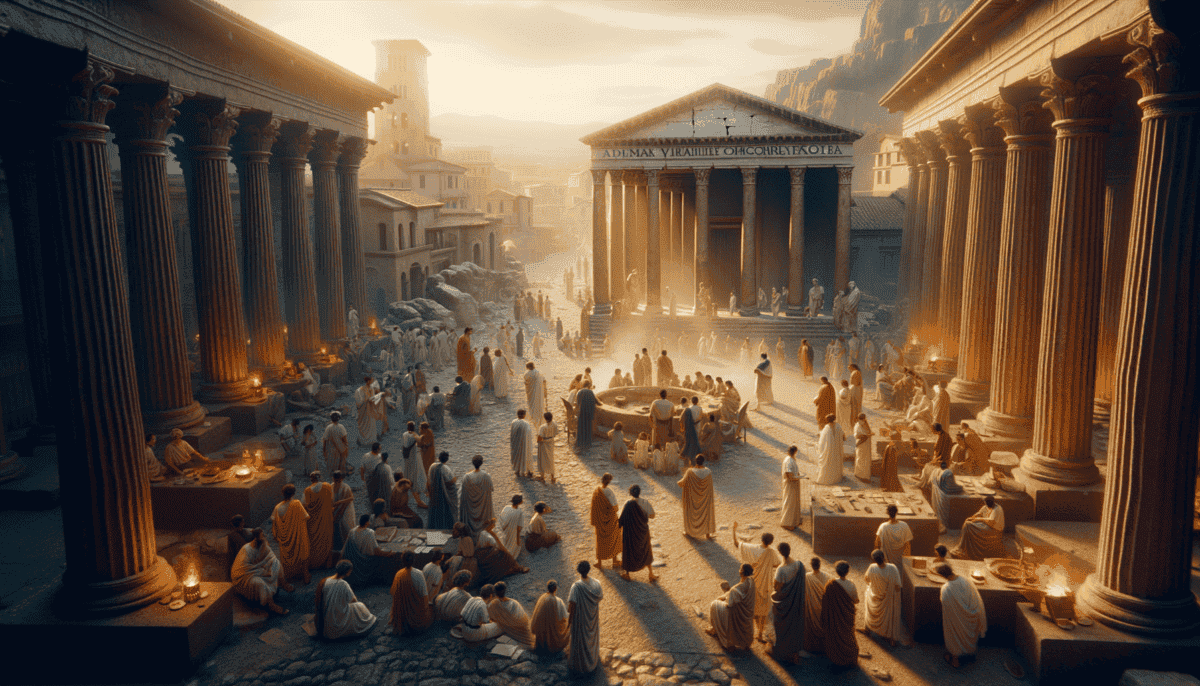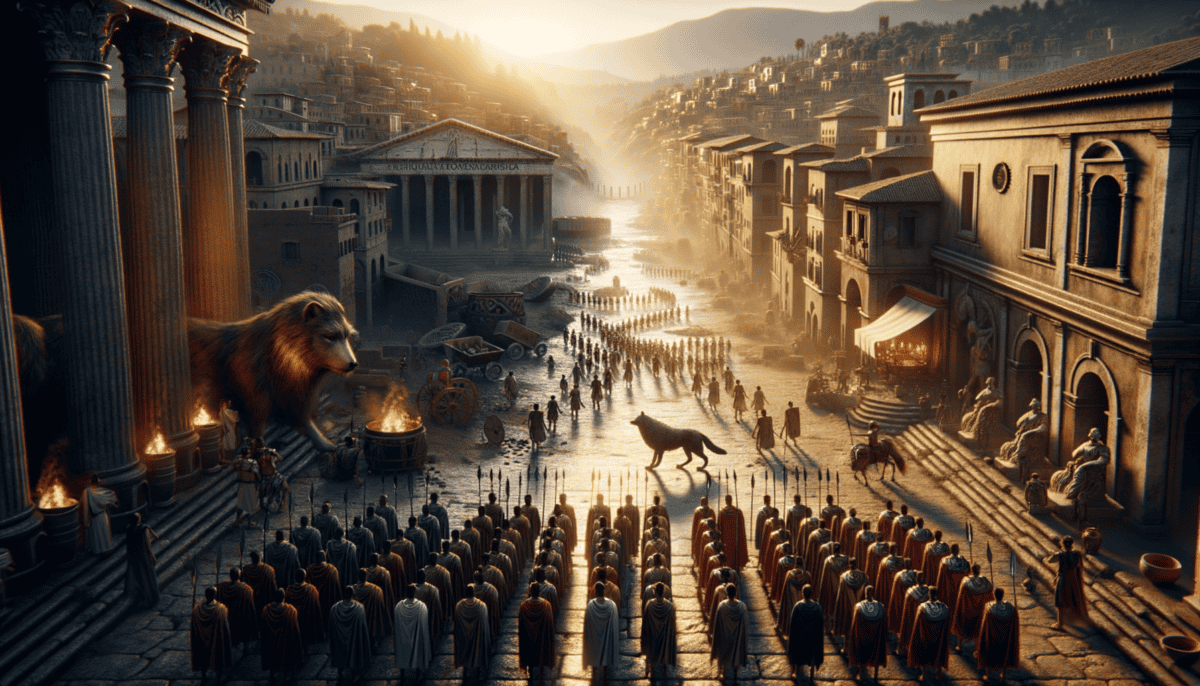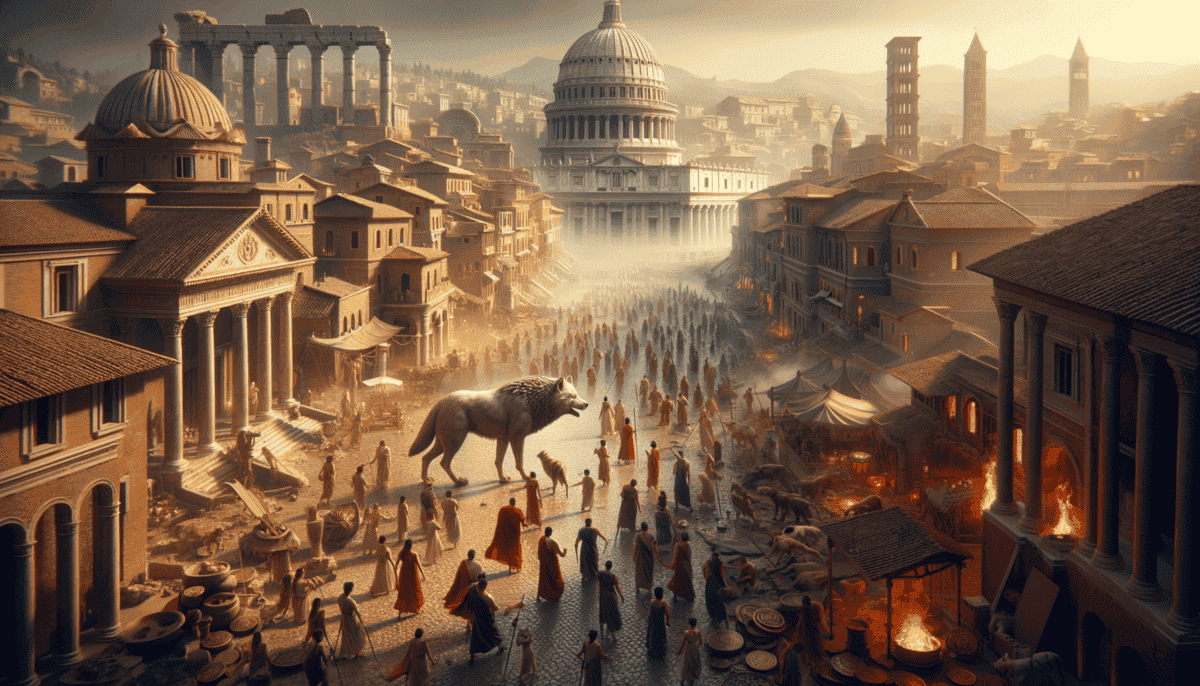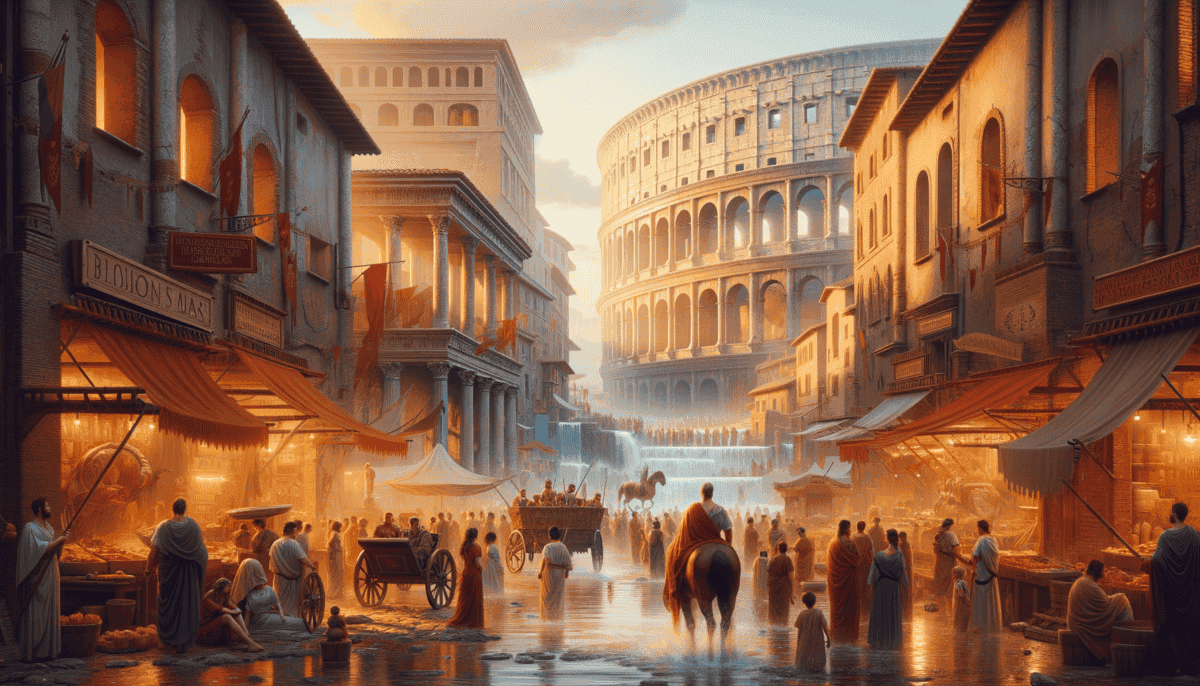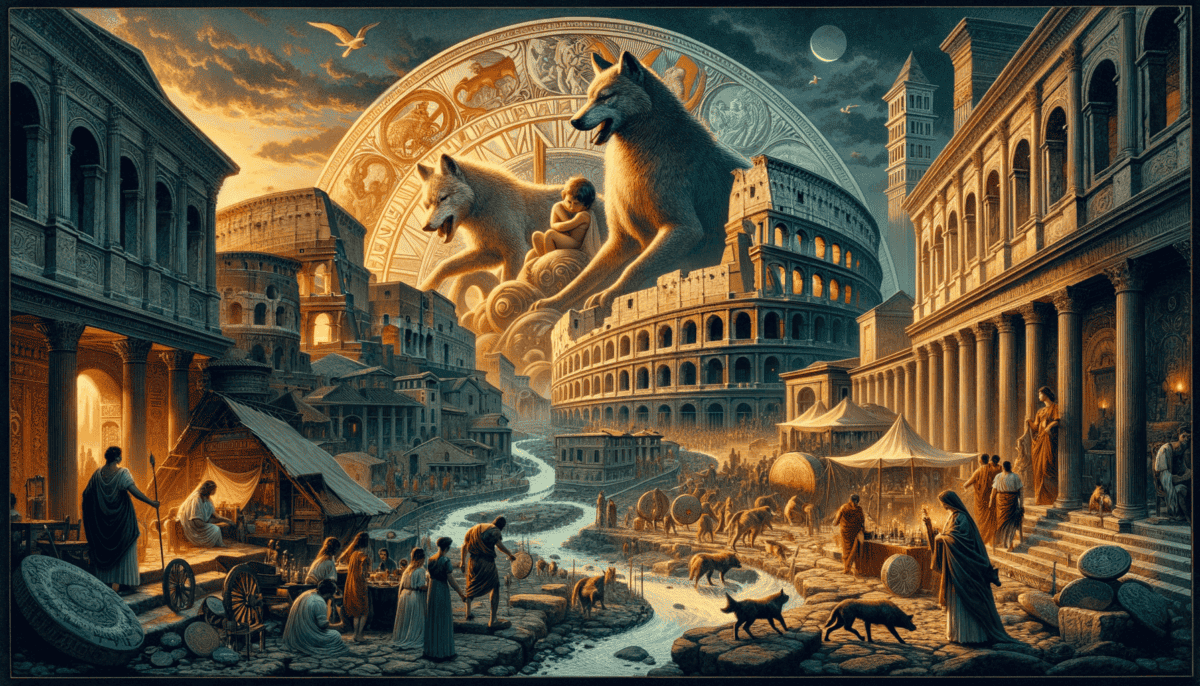The Wolf’s Children
Marcus sat by the crackling fire, his eyes wide with wonder as his grandfather began to tell the tale of their great city's birth. The warm glow danced across their faces as the old man's voice filled their small Roman home.
"Long, long ago, when our mighty Rome was just a dream," Grandfather began, "there lived two special baby boys named Romulus and Remus. "
Young Marcus leaned forward. "But where did they come from, Grandfather?"
"Ah, that's where our story gets interesting! These twins were no ordinary babies. Their mother was a princess named Rhea Silvia, but a mean king was afraid the boys would take his throne. So he ordered the babies to be thrown into the Tiber River."
Marcus gasped. "That's terrible! Did they survive?"
Grandfather nodded with a smile. "They did! The river carried them safely to shore, where something amazing happened. A mother wolf found them and took care of them as if they were her own cubs. She fed them and kept them warm in her cave."
"A real wolf?" Marcus's eyes grew even bigger.
"Yes! And later, a shepherd named Faustulus found the boys and raised them as his own children. They grew up to be strong and brave young men."
The fire popped and sparked as Grandfather continued. "When Romulus and Remus learned they were really princes, they decided to build their own city. But first, they had to choose where to build it."
"I know this part!" Marcus bounced excitedly. "They looked at the seven hills!"
"That's right! Each brother wanted to build the city on a different hill. Romulus chose the Palatine Hill, and Remus picked the Aventine Hill. They decided to let the gods choose by watching for a sign in the sky."
The brothers watched and waited. Remus saw six birds, but Romulus saw twelve! It seemed the gods had chosen Romulus’s hill.
"But Remus got angry," Grandfather's voice grew serious. "He made fun of the walls Romulus was building. He even jumped over them to show how weak they were. This made Romulus very mad, and in his anger…" Grandfather paused.
"What happened?" Marcus whispered.
"Romulus killed his brother. It was a terrible thing, but from that day forward, Romulus became the first king of our city. He named it Roma – Rome – after himself."
Marcus sat quietly, thinking about the story. "Is that why we live on these hills now?"
"Yes, little one. Romulus welcomed many people to his new city. He invited farmers, shepherds, and traders to live here. Our city grew bigger and stronger. He made laws and chose helpers called senators to make Rome a good place to live."
• Built strong walls around Rome
• Made good laws for the people
• Created the first Roman army
• Started the Senate to help make decisions
"Every time I see a wolf picture in the city," Marcus said proudly, "I think about how brave Romulus and Remus were as babies."
Grandfather patted Marcus's head. "That's right. And remember, just like those twins long ago, every Roman has the chance to be brave and do great things. Our city started with just two babies by a river, and look at us now – the greatest city in the world!"
The fire was getting low now, but Marcus's imagination was burning bright with visions of wolves, brave twins, and the birth of his beloved Rome. Outside their window, the mighty city that grew from that tiny beginning stretched across its seven hills, its torch-lit streets telling countless more stories of courage, wisdom, and destiny.
A New Way to Rule
Marcus rushed through the bustling Forum, dodging between market stalls and groups of citizens in white togas. The excitement in the air was different today. ️
“Big changes are coming!” his friend Julia called out, running to catch up. “Father says we won’t have kings anymore!”
The children stopped to catch their breath near the Senate house, where important men in fancy togas were going inside. Some looked happy, others worried.
“But who will be in charge?” Marcus asked, watching another group of senators climb the steps.
“Everyone will help!” Julia explained proudly. “Well, not kids like us. But the grown-ups will vote and pick leaders called consuls. They’ll only be in charge for one year.”
Marcus scratched his head. “One year? That’s not very long.”
“That’s the point!” came a deep voice. It was Julia’s father, Senator Claudius, walking up behind them. “We don’t want anyone to become too powerful, like the kings were.”
The children turned to listen as Claudius explained more. “From now on, Rome will have two consuls leading together. If one tries to be unfair, the other can stop them.”
The senator’s eyes sparkled with pride. “And the best part? The people will have a voice through their tribunes and the Senate.”
“Can you tell us more about the Senate?” Marcus asked eagerly.
Claudius sat down on a nearby bench, and the children gathered close. “The Senate is like a big council of wise citizens. We meet to talk about important things like:”
• Planning how to protect Rome
• Deciding how to spend money
• Solving problems between citizens
“But what about our army?” Marcus wondered. “Who tells them what to do now?”
“Ah, good question!” Claudius smiled. “Our army is getting stronger every day. The consuls will lead them together, making sure Rome stays safe and grows stronger.”
Just then, a loud cheer erupted from the Senate house. People began pouring out, their faces bright with excitement.
“What’s happening?” Julia jumped up to see better.
“They’ve done it!” Claudius stood up. “The vote is finished. Rome is now officially a republic!”
The crowds in the Forum grew larger as more people came to celebrate. Some were dancing, others were hugging. Marcus saw his mother waving from her market stall.
“Will everything be different now?” he asked, suddenly feeling a little worried.
Claudius put a reassuring hand on his shoulder. “Some things will change, but for the better. Rome will be stronger because we’ll all work together. Every citizen will have a chance to help make our city great.”
“Even us someday?” Julia asked hopefully.
“Especially you!” her father laughed. “You’re the future of Rome. This new republic we’re building – it’s for you and your children, and their children too.”
As the sun began to set, the Forum glowed with hundreds of torches. People were still celebrating, sharing food and wine, telling stories about what the republic would bring. Marcus looked up at the starry sky, imagining all the exciting changes ahead. Rome wasn’t just a city anymore – it was becoming something new and wonderful, where every citizen could help shape their future.
The March of Roman Legions
The morning sun glinted off thousands of bronze shields. Young Lucius watched in awe as the Roman legion marched past his family’s farm. The ground rumbled under their feet. ️
“Why are there so many soldiers, Papa?” Lucius asked, counting the rows of men in red cloaks.
His father smiled. “Rome is growing, son. These brave men are heading north to protect our lands and make new friends.”
Centurion Flavius, leading his unit, spotted the boy’s excited face and waved them over. “Want to see something special?” he asked, kneeling to Lucius’s level.
The centurion showed them his shiny helmet with its red brush on top. “This tells my men where I am in battle. See how it goes side-to-side? Other officers wear theirs front-to-back.”
“It’s so heavy!” Lucius exclaimed, trying to lift it.
“That’s because it keeps us safe,” Flavius laughed. “Just like everything else we carry.”
He opened his pack to show them what Roman soldiers took on their march:
• Special shoes for long walks
• Tools for building camps
• Food for many days
• Water in leather bags
“But Rome doesn’t just want to fight,” Flavius explained. “We build things too! When we meet new people, we show them how to make roads, build towns, and trade with us.”
“Like the new road by our farm?” Lucius asked excitedly.
“Exactly!” Flavius beamed. “Those roads help everyone – farmers can sell food, traders can travel safely, and messages can move quickly.”
A horn sounded in the distance. “Time to move!” Flavius stood up. “We’re heading to a place called Veii first. They have strong walls, but we have something better.”
“What’s that?” Lucius asked.
“Teamwork!” Flavius grinned. “See how our soldiers march together? That’s Rome’s real strength. We work as one, like a big family.”
Important Message: When Rome met new people, they often invited them to become Roman citizens. This helped Rome grow bigger and stronger!
As the legion continued their march, more children from nearby farms ran out to watch. Some soldiers gave them wooden swords they had carved during rest breaks.
“Will you come back and tell us about your adventures?” Lucius called out to Flavius.
“Better than that,” the centurion replied. “When we’re done, you can visit the cities we build. You’ll see theaters, bath houses, and schools – just like in Rome!”
That evening, Lucius played with his new wooden sword as his mother prepared dinner. “Papa, do you think I could be a soldier someday?”
His father looked thoughtful. “You could be many things, son. Rome is growing bigger every day. We need farmers, builders, traders, and yes, brave soldiers too.”
“But remember,” his mother added, “the best Romans aren’t just strong with swords. They’re kind and smart too. They help make new friends for Rome.”
As the sun set, Lucius could still hear the distant marching of the legion. He dreamed of the new places they would go and the amazing things they would build. Rome wasn’t just his home anymore – it was becoming the home of many people, all working together to make something wonderful.
From his hilltop, he watched the torches of the legion disappear into the darkness, knowing that tomorrow they would bring more people into Rome’s growing family. The world was getting bigger, and Rome was growing with it, one step at a time.
The Rise of the Emperors
The marketplace buzzed with excitement. Young Marcus pushed through the crowd, holding his grandfather’s hand. People shouted and cheered as a tall man in a purple cape rode by on a white horse.
“Who is that, Grandfather?” Marcus asked, standing on tiptoes.
“That’s Julius Caesar, my boy. He’s changing Rome in big ways.”
Marcus watched as Caesar tossed gold coins to the crowd. People scrambled to catch them, laughing and cheering his name.
“Why do they love him so much?” Marcus wondered aloud.
His grandfather smiled. “Caesar gives food to poor people. He builds new homes and makes sure everyone has work. He even lets soldiers who finish fighting have their own farms!”
But not everyone was happy with Caesar. Some senators thought he was becoming too powerful. One day, everything changed.
“Caesar is gone,” Grandfather said sadly one morning. “Bad men hurt him. Now his nephew Octavian will lead Rome.”
Octavian was young and smart. He changed his name to Augustus and became Rome’s first emperor!
• Built beautiful marble buildings
• Made roads safer for travelers
• Started a fire brigade
• Brought peace for many years
• Helped poor people get food
“Look, Marcus!” Grandfather pointed to new workers in the street. “Augustus is making our city shine like gold!”
Marcus watched as men laid smooth stones for new roads. Others painted bright colors on temple walls. Everything seemed to sparkle!
Amazing Change: Under Augustus, Rome grew from a city of brick to a city of marble!
One day, Marcus and his grandfather visited the new forum Augustus built. It was huge! Tall columns reached to the sky. Beautiful statues stood everywhere.
“Why is everything so big?” Marcus asked.
“Augustus wants to show how strong Rome is,” Grandfather explained. “Now we rule lands from snowy mountains to hot deserts!”
People came from all over to live in Rome. Marcus made new friends whose families spoke different languages and ate different foods.
“That’s the best part about Rome now,” his grandfather said. “We’re like one big family, even though we’re all different.”
Years passed. Augustus ruled for a long time, and Rome grew peaceful and rich. Other emperors came after him. Some were good, some were bad, but Rome kept getting bigger.
Marcus grew up and had children of his own. One evening, his daughter asked him about the old days.
“I remember when Augustus made Rome shine,” he told her, smiling at the memory. “He showed us that one person can make big changes if they work hard and care about others.”
As the sun set, Marcus looked out over the city. Golden light sparkled on marble buildings and broad streets. Somewhere in the distance, he could hear music playing and children laughing.
Rome was more than just a city now. It was the biggest empire the world had ever seen. From the foggy forests of Britain to the sandy shores of Egypt, millions of people called themselves Romans.
And it all started with two men who dreamed big – Julius Caesar and Augustus, who turned Rome from a republic into an empire that would amaze people forever.
Life in Ancient Rome
Young Lucia skipped down the busy street, dodging water carriers and fruit sellers. The morning sun sparkled on the grand buildings of Rome.
“Watch where you’re running, little one!” called her mother, Julia, who carried a basket of fresh bread.
Life in Rome was exciting! Everywhere Lucia looked, something amazing was happening. Builders worked on tall apartments called insulae. Artists painted colorful murals on walls.
“Mama, look at the new aqueduct!” Lucia pointed at the huge stone bridge carrying water into the city.
“Yes, dear. The Romans are very clever builders. That water comes from miles away to fill our fountains and baths!”
• Concrete that could dry underwater
• Roads that lasted thousands of years
• Heated floors for houses
• Big bridges called aqueducts
• Public bathrooms with running water
At the marketplace, Lucia saw people from all over the empire. There were traders from Africa selling purple cloth, and merchants from Syria with sweet-smelling spices.
“Papa!” Lucia ran to hug her father, Marcus, who was working on a new building.
“Hello, my little engineer!” He lifted her up to see the plans. “We’re building something special – a dome bigger than any before!”
“How do you make it stay up?” Lucia asked, eyes wide with wonder.
“Roman concrete is magic,” Marcus winked. “It’s lighter at the top and stronger at the bottom. Plus, we put special holes in the dome to make it less heavy.”
Later that day, Lucia and her family went to the public baths. ♀️
“This is better than a palace!” Lucia splashed in the warm pool. The walls sparkled with tiny tiles making pictures of sea creatures.
“The baths are for everyone,” her mother explained. “Rich or poor, in Rome we all get clean together!”
Important: Romans loved being clean! They had public baths in every city.
At home that evening, Lucia practiced writing on her wax tablet. Roman children learned reading, math, and history. Some even went to school!
“Papa, tell me about the shows at the Colosseum!” Lucia begged.
“Well, thousands of people gather there to watch gladiators and see amazing animals from far away lands. But sometimes it’s too rough for little girls,” Marcus said gently.
The next day, Lucia visited the temple with her mother to leave flowers for the gods. Romans believed in many gods who helped with different things.
“Mama, why does that lady have different colored clothes?” Lucia whispered.
“She’s from Germania, far in the north. In Rome, we welcome people from everywhere. They bring new ideas and make our city better.”
At sunset, the family sat in their small garden, eating olives and fresh bread. The sky turned purple over the seven hills of Rome.
“Listen!” Lucia said. They could hear music from a neighbor’s house, children playing in the street, and the splash of fountains.
“This is the sound of Rome,” her father smiled. “The biggest, busiest, most exciting city in the world!”
That night, as Lucia drifted off to sleep, she thought about all the wonderful things in her city – the tall buildings, clever inventions, and friendly people from everywhere. She was proud to be Roman!
The Last Days of Rome
Marcus stood on the city walls, watching the sunset paint Rome’s buildings in golden light. His daughter Lucia, now grown, stood beside him. The city had changed much since her childhood.
“Father, why are there fewer merchants in the markets these days?” Lucia asked.
Marcus sighed. “The trade routes aren’t as safe as they used to be. Many roads need fixing, and there are raiders in far provinces.”
Down in the Forum, people gathered to hear the latest news. Some spoke of armies approaching from the north. Others worried about the rising cost of bread.
“Remember when we could buy spices from Syria?” Julia asked, joining them. “Now it’s hard to find even simple things.”
But not everything was getting worse. Roman ideas were spreading far and wide:
• Laws that many countries still use
• Ways to build strong buildings
• Languages like French and Spanish
• Ideas about government
• Roads and city planning
Lucia’s son, little Marcus, played with his wooden sword. “Tell me about the old days, Grandpa!”
“Well,” Marcus smiled, “Rome wasn’t built in a day. It started with two brothers and a dream. We grew from a tiny village to rule lands far away.”
“Were Romans the strongest ever?” little Marcus asked.
“We were strong because we learned from others. We took good ideas from Greece, Egypt, and far-away lands. We made them better and shared them with everyone.”
That evening, they walked through the city. Some buildings needed fixing, but many still stood proud. ️
Remember: Even today, people study Roman buildings to learn how they were made!
“Look!” little Marcus pointed at soldiers marching. “They don’t look like the old pictures.”
“Many are from German tribes now,” Lucia explained. “They help protect Rome, just as we once protected their lands.”
At home, they lit oil lamps as darkness fell. Julia taught little Marcus to write Latin, just as she had taught Lucia years ago. Roman words lived on in many languages.
“Rome is changing,” Marcus said, “but change isn’t always bad. Our ideas, our laws, our stories – they’ll live on.”
Months passed. More tribes crossed the borders. Some came peacefully, wanting to be part of Rome. Others brought war. ⚔️
One day, news reached them that Rome wasn’t the only capital anymore. The emperor now ruled from a new city in the east called Constantinople.
“What will happen to Rome?” little Marcus asked.
“Rome isn’t just a city,” Lucia smiled. “It’s an idea. Wherever people build roads, make fair laws, or tell our stories, a piece of Rome lives on.”
Years later, when the last Roman emperor stepped down, the empire in the west ended. But Rome’s gifts to the world remained:
Grand buildings still stood. Roman roads still connected cities. People still spoke languages born from Latin. Courts still used Roman laws.
And in cities everywhere, children like little Marcus grew up hearing stories about the great city that began with two brothers, a wolf, and seven hills.
“Remember,” Marcus told his grandson, watching the sun set over the eternal city, “as long as people dream of building something great, as long as they work together and learn from each other, the spirit of Rome will never die.” ✨
And he was right. Today, thousands of years later, we still use Roman ideas. We build with concrete, speak words from Latin, and live by laws first written in Rome. The story of Rome reminds us that great things take time to build – and their legacy can last forever.


